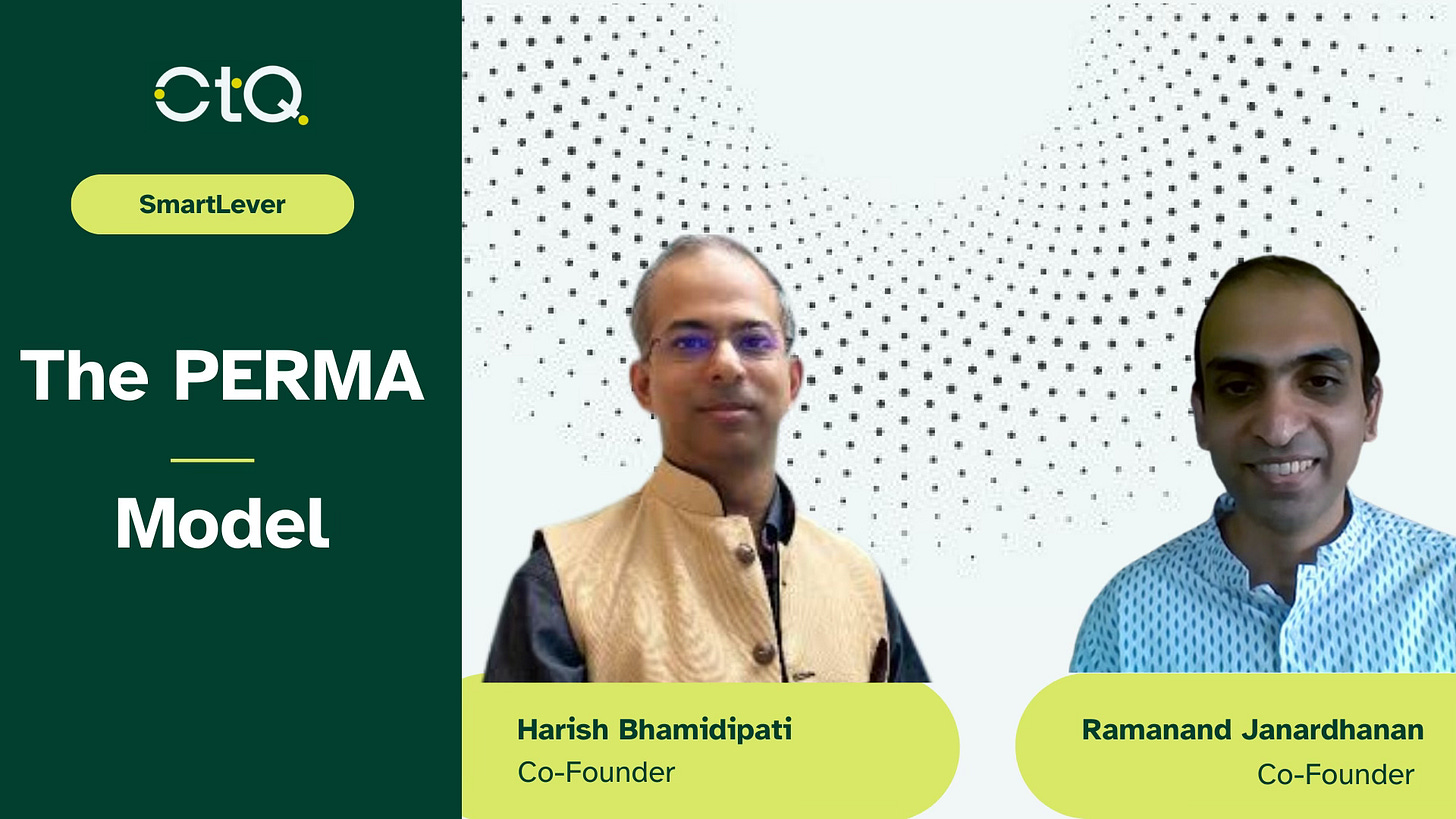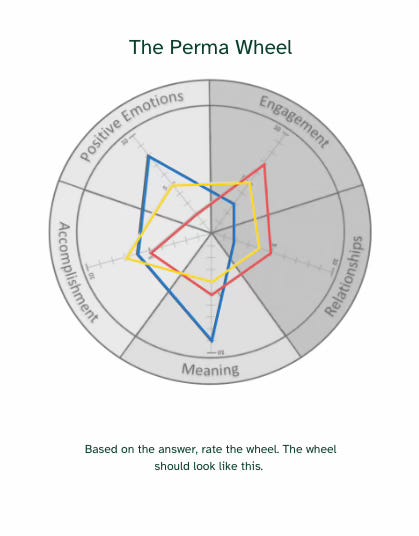We usually send out our newsletters every Friday, but we decided to make this a special one. We’re using one of our favorite models to Celebrating India’s Independence Day! Hence, this would be reaching your inbox on a Wednesday. So without further ado, let’s begin.
The PERMA Model
Implementing PERMA in your life can lead to increased life satisfaction and overall well-being. This was developed by positive psychologist Martin Seligman, who outlines five key elements of well-being and happiness:
1. Positive Emotions: Experience joy, gratitude, and contentment.
2. Engagement: Immerse yourself in activities you enjoy.
3. Relationships: Foster meaningful connections with others.
4. Meaning: Find purpose and contribute to something greater than yourself.
5. Accomplishments: Set and achieve goals to feel a sense of progress.
Unlike traditional psychology, which often focuses on mental health challenges, positive psychology aims to study individuals leading happy and fulfilling lives or those who may be struggling yet report a high sense of satisfaction.
Watch our detailed discussion of PERMA Model here:
Independence as a Pursuit of Well-Being
As we celebrate India's Independence Day, let's explore how the journey of our nation aligns with the PERMA model of well-being:
P - Positive Emotions:
When people think of happiness, this is often what comes to mind—feeling good in the moment. However, PERMA goes beyond this immediate sense of happiness. For example, someone might face struggle and stress while working through a challenging situation but feel deeply satisfied with the end result.
We, Indians, are proud of our leaders who fueled India's freedom movement. They awoke hope, resilience, and collective unity, which are indeed central to the PERMA model. We’ve seen and heard so many stories of them maintaining optimism even in the face of adversity.
Best of all this trend continues even today. Our Indian Defense Forces sacrifice so much to keep our nation safe. We had the honor of interviewing one such Shaurya Chakra winner, Col (Retd.) Vembu Shankar. You can catch his whole interview here.
E - Engagement:
This element encompasses the concept of "flow," where you become fully absorbed and engaged in activities. Think of a time when you were so involved in a task that you lost track of time—this is engagement at work.
It’s very important to have a deep engagement or passion for what you’re doing. A very big example lies in the very deep engagement that freedom fighters had in the struggle for independence. We’ve seen movies like “Rang De Basanti” which reflects the Engagement pillar of PERMA.
This can segue into how we, as individuals, can engage deeply with causes we care about to foster a sense of purpose and fulfillment.
R - Relationships:
Human contact and strong social bonds contribute significantly to our well-being. These relationships offer support and enrich our lives in countless ways.
In the pre-independence era, even without the internet & social media, it’s exemplary how our freedom fighters inked strong bonds, from grassroots movements to leadership circles. These relationships were crucial for the success of the movement, just as strong relationships are vital for personal well-being.
Post-Independence, India is forging ahead with strong relationships with other countries also. We seem to be going on the right track to making India a super power within the next decade.
P.S. It’s equally important, though, to commemorate the collaborative efforts that led to independence. So go out there for the “Flag Hoisting Ceremony” and be proud to be Indian.
M - Meaning:
This aspect looks at the bigger picture. It is the purpose that drives us and makes us feel like a part of something larger than ourselves. Teaching, mentoring, or contributing to a cause can bring a profound sense of meaning.
Independence Day is fundamentally about the meaning of freedom and self-determination. Similarly, we all need to find meaning in our own lives—whether through work, family, or service—and it’s critical to understand how each of these also contributes to overall well-being.
A - Accomplishments:
Achieving goals, earning recognition, or reaching personal milestones fall under this category. While it's essential to aim for grand achievements, even small victories contribute to our overall sense of accomplishment.
Independence is one of India’s greatest accomplishments. We’ve of course gone on to have successful business leaders in every industry, Indians are CEOs in so many Fortune 500 companies, Bollywood is one of the biggest industries worldwide, our military prowess coupled with our enviable space mission track record have made us a power to reckon with.
Applying the PERMA Model:
To make the PERMA model more tangible, let's look at some practical examples. For those feeling unsatisfied in their job, identifying activities that bring positive emotions can be enlightening. For instance, if you find joy in quizzing, writing, or helping others, those are clues to what positively impacts your emotional state.
Engagement might look like feeling "in flow" while teaching a new concept or solving problems, even if it leaves you exhausted. If you derive satisfaction from it, that's a sign of deep engagement.
For positive relationships, consider the people you enjoy collaborating with or those you cherish spending time with. Building and maintaining these relationships can boost your well-being.
When it comes to meaning, think about higher-order purposes. For example, mentoring might not always yield personal benefits immediately, but it can provide a strong sense of fulfillment and purpose.
Accomplishment is also crucial. While recognition, like awards or titles, is valuable, remember to appreciate the small wins. They all contribute to your sense of achievement.
A Word of Caution
It's important to remember that no model is perfect. The U.S. Army tried to implement the PERMA model to assist veterans with PTSD, but the results were mixed. While not harmful, it didn't help to the extent expected. As with any psychological model, it's essential to apply it contextually and not blindly.
Final Thoughts
The PERMA model is a powerful tool, but its effectiveness can vary. Assess your unique situation and feel free to adapt or even critique the model. Your experience can inform and refine how you use these concepts in your life.
Remember, put on your own oxygen mask first. By understanding and applying the PERMA model, you can lead a more fulfilling life and subsequently better help those around you.
We have designed this PERMA Wheel, by which you can assess yourself on the fly. Send us a message (by clicking below) & we’ll email this to you.
We hope you explore the PERMA model further and share your experiences with us. What worked for you? What didn't? Let's learn and grow together.
If you loved this newsletter and wish to uplevel
Yourself: Watch our YouTube Playlist & join CTQ Compounds.
Your Team: See our Case Studies & connect with us




